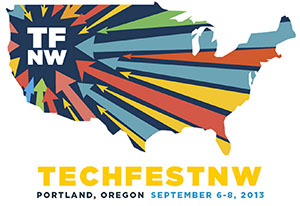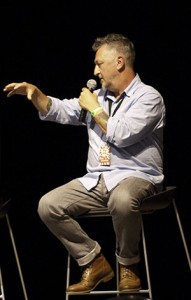 TechFest Northwest is the 2 year-old self-described “little sister” to the long-running Music Fest Northwest held every fall in Portland, Oregon. One track of TFNW’s first day this year was dedicated to the relationship between art and technology, with music and musicians taking a prominent place.
TechFest Northwest is the 2 year-old self-described “little sister” to the long-running Music Fest Northwest held every fall in Portland, Oregon. One track of TFNW’s first day this year was dedicated to the relationship between art and technology, with music and musicians taking a prominent place.
Although one afternoon panel was provocatively titled “Technology killed the radio star,” there was, in fact, very minimal talk of radio specifically, even in that panel. Instead, much of the discussion thow whole day surrounded how an independent “middle class” of working musicians may be able to take advantage of the new technology landscape to support their careers.
The welfare of musicians and radio have always been bound together. The minority of innovative and forward-looking stations, in particular, have depended upon access to emerging artists and labels. This is all the more true for online radio, from streaming services to more conventionally programed and curated stations. Therefore the topic is particularly relevant for terrestrial as well as online radio.
Yet, that terrestrial broadcast radio was largely absent from the discussion at TFNW is evidence of how the mainstream commercial radio industry has made itself irrelevant to all but the most successful artists and major labels willing to plow tens of thousands of dollars into the promotional apparatus. Through 17 years of immense consolidation resulting in the homogenization and delocalization of station playlists, radio has obsoleted itself as a means for discovering new artists and music, especially for the generations who have grown up with the internet.
This point became crystal clear during the question and answer following a short presentation by Brooke Parrott on how the middle class of musicians can “tour intelligently,” booking concerts where fans most want to see them, based on data the more accurately reflects this potential. Parrott is artist ambassador for Songkick, which bills itself as the second largest concert site after Ticketmaster.
During her presentation Parrott said local radio airplay has been one of the inexact data points in deciding where an artist should book concerts. But she argued that model is broken. So I asked her what role radio plays in the new era of more intelligent touring.
Parrott paused for a moment, smiled and said, “I have no idea.” She continued, “Radio play and Facebook likes are data points related to recorded music, not the live space.”

Dave Allen
Maggie Vail, who runs the independent Bikini Kill record label, followed up on Allen’s comment, saying, “and in America you wouldn’t get paid even if your record was played on the radio.” She was referring to the fact that in the US radio stations are not obligated to pay royalties for playing recordings on the air. This is not the situation in most countries, where artists and labels are paid these so-called “mechanical royalties” for radio play.
Hearing this exchange, one could be forgiven for getting the sense that terrestrial radio’s value is dwindling.
At the same time, many musicians are quite unhappy with the level of royalties that they do receive from the online services like Pandora and Spotify that pay them. Allen, who has been working at the intersection of music, technology and user experience for 20 years, offered the opinion that the problem has as much to do with the major labels and the deals they cut as anything else. “There’s a mistaken idea that the recording industry wrote contracts to help artists” he said.
“Users drive all new technology because they demand things, and they don’t stop. If it’s not provided for them by engineers and companies they find new ways to get it,” Allen explained. “We’re living in a mobile world. The streaming companies understand that everyone wants their music easily and cheaply where they are. The device is not mobile, the human being holding the device is mobile. And that’s been sorted out by the streaming services.”
Despite artists’ problems with the major label system, Vail offered ways that record labels, especially independent ones, are still valuable. She explained that at Kill Rock Stars, where she worked for 17 years, contracts are 50–50 splits between the artist and the label. The label also provides promotion and distribution of the music, along with contact with the press and radio. “If you don’t have a label,” she said, “you have to figure out how to do this yourself.”
Panelist Jared Mees agreed with Vail, noting that labels “help artists to get organized, (and obtain) structure and connections to people who can help them. I recently realized that this is never going to go away, it’s just going to get a different name. Most artists won’t be intrinsically organized, because they’re thinking about music, ideas and how to change the world.” Mees is the co-founder of Portland-based record label, consignment shop and screen-printing studio Tender Loving Empire
Allen provided a little historical perspective, recounting that, “when I was working at emusic.com in 2006 we were talking about the mythical music jukebox in the sky. Now we have it, and everyone’s complaining. MP3.com was sued out of putting music in the cloud, and now it’s OK.”
In the end, Allen argued “Technology doesn’t care, the reason why we have these panels is the music part. Everyone loves music. Technologists just haven’t come up with an amazing way to make that glue between that mp3 file streaming and the band.”
Vail agreed, saying “it’s about the artist and about the fan.” She said this is “the holistic view.”
It used to be that terrestrial radio provided much of this glue, playing new artists’ music, bringing them on air for interviews and in-studio performances, then sponsoring their concerts. To some extent this still happens. Yet how many times do you see some commercial rock station sponsoring the concert for a band you pretty much never hear on that station?
Non-commercial stations like KEXP, WFMU and The Current, as well as NPR Music are bridging the gap each in their own way, and have been online innovators way ahead of Clear Channel ever thinking of iHeartRadio. But these noncoms are the minority–not every market or city has one.
Radio once was the glue that puts artists and fans together, but that bond has been eroded by the broadcast industry’s greed and mismanagement. Music radio’s future depends on re-establishing this bond, and making it stronger.
Technology didn’t kill the radio star. It was suicide.


